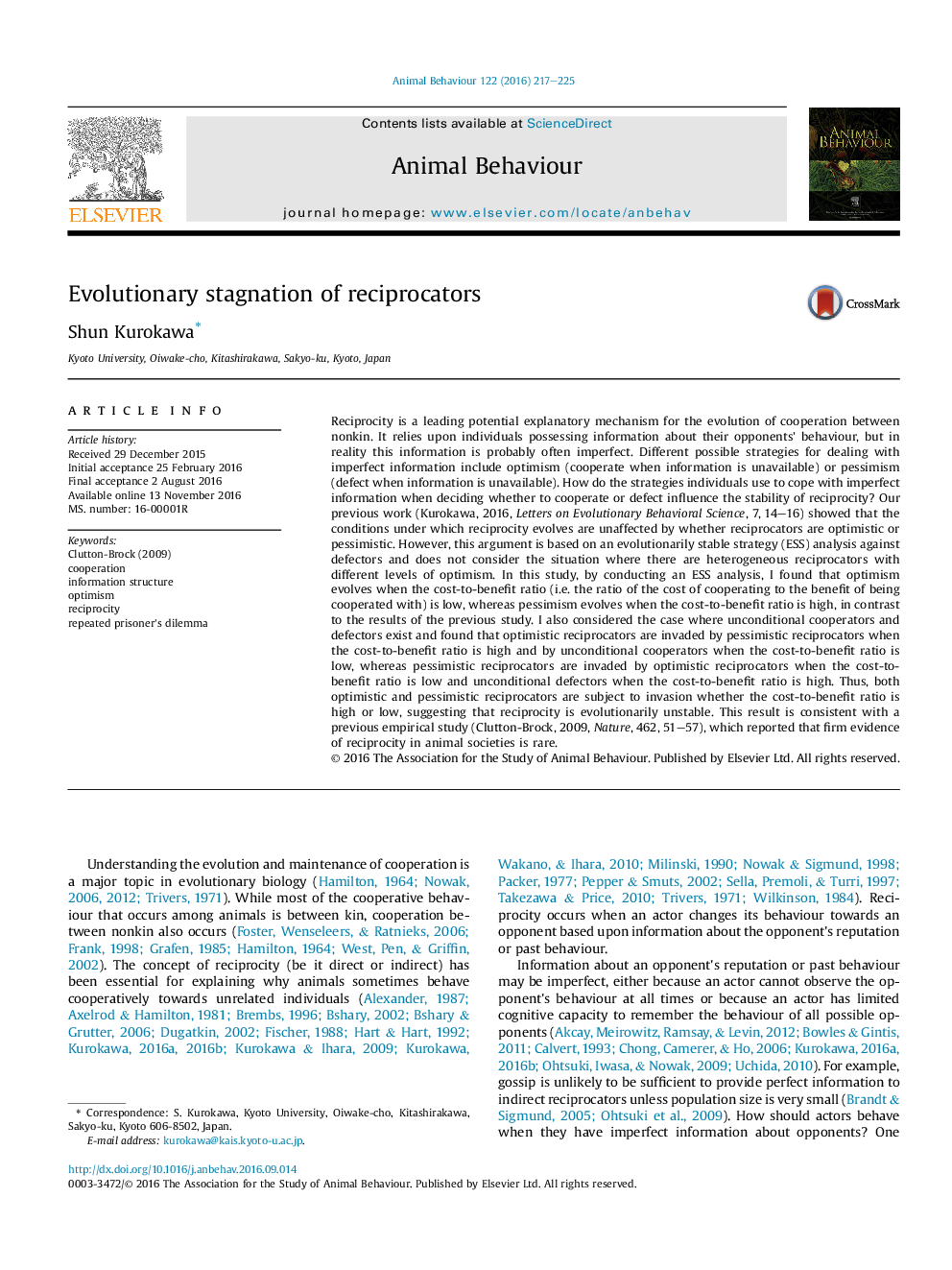| کد مقاله | کد نشریه | سال انتشار | مقاله انگلیسی | نسخه تمام متن |
|---|---|---|---|---|
| 5538388 | 1552206 | 2016 | 9 صفحه PDF | دانلود رایگان |
عنوان انگلیسی مقاله ISI
Evolutionary stagnation of reciprocators
ترجمه فارسی عنوان
رکود تکاملی متقابل
دانلود مقاله + سفارش ترجمه
دانلود مقاله ISI انگلیسی
رایگان برای ایرانیان
کلمات کلیدی
کلوتون برک (2009)، همکاری، ساختار اطلاعات، خوش بینی، متقابل، معضل مکرر زندانی،
موضوعات مرتبط
علوم زیستی و بیوفناوری
علوم کشاورزی و بیولوژیک
علوم دامی و جانورشناسی
چکیده انگلیسی
Reciprocity is a leading potential explanatory mechanism for the evolution of cooperation between nonkin. It relies upon individuals possessing information about their opponents' behaviour, but in reality this information is probably often imperfect. Different possible strategies for dealing with imperfect information include optimism (cooperate when information is unavailable) or pessimism (defect when information is unavailable). How do the strategies individuals use to cope with imperfect information when deciding whether to cooperate or defect influence the stability of reciprocity? Our previous work (Kurokawa, 2016, Letters on Evolutionary Behavioral Science, 7, 14-16) showed that the conditions under which reciprocity evolves are unaffected by whether reciprocators are optimistic or pessimistic. However, this argument is based on an evolutionarily stable strategy (ESS) analysis against defectors and does not consider the situation where there are heterogeneous reciprocators with different levels of optimism. In this study, by conducting an ESS analysis, I found that optimism evolves when the cost-to-benefit ratio (i.e. the ratio of the cost of cooperating to the benefit of being cooperated with) is low, whereas pessimism evolves when the cost-to-benefit ratio is high, in contrast to the results of the previous study. I also considered the case where unconditional cooperators and defectors exist and found that optimistic reciprocators are invaded by pessimistic reciprocators when the cost-to-benefit ratio is high and by unconditional cooperators when the cost-to-benefit ratio is low, whereas pessimistic reciprocators are invaded by optimistic reciprocators when the cost-to-benefit ratio is low and unconditional defectors when the cost-to-benefit ratio is high. Thus, both optimistic and pessimistic reciprocators are subject to invasion whether the cost-to-benefit ratio is high or low, suggesting that reciprocity is evolutionarily unstable. This result is consistent with a previous empirical study (Clutton-Brock, 2009, Nature, 462, 51-57), which reported that firm evidence of reciprocity in animal societies is rare.
ناشر
Database: Elsevier - ScienceDirect (ساینس دایرکت)
Journal: Animal Behaviour - Volume 122, December 2016, Pages 217-225
Journal: Animal Behaviour - Volume 122, December 2016, Pages 217-225
نویسندگان
Shun Kurokawa,
